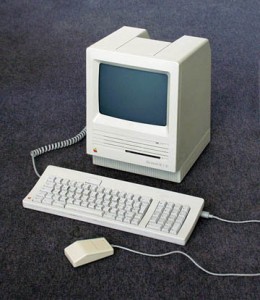 Cathleen bought her mother an iPhone just lately. Aloma Collins is 88, and her health is slowly failing. She’s in an awful spot, unable to do much and yet bored to tears.
Cathleen bought her mother an iPhone just lately. Aloma Collins is 88, and her health is slowly failing. She’s in an awful spot, unable to do much and yet bored to tears.
The iPhone has become a bright spot on her horizon. Cathy loaded it with some apps, and Aloma has since figured out how to add others. She’s big on email and card games, so far. I don’t know if she’s surfing the web, but you can be sure she will be in due course.
When the Macintosh was introduced in 1984, it was advertised as being “The computer for the rest of us.” This was true at the time, when DOS was a ubiquitous zombie wraith afflicting the earth like the undead Unix. And Windows has sucked so perfectly, over the years, that the Mac segment of the computing marketplace has always had ample gloating space.
But what about Aloma? What about my own mother, who has so far managed to reject two EZ-to-use computing paradigms?
The iPad is the answer, or the first step toward an answer. For everyone who gets frustrated by the arcane modalities of the PC world, the iPad offers instant results, instant gratification, instant satisfaction.
Many of our ideas about computing are based in a puritanical reading of Dante’s Inferno: “How can you hope to enter data processing heaven without first having trundled your way through data processing hell?” This is hugely satisfying to many of us living the wired life, especially Windows and Unix geeks, and most especially Microsoft Certified Cash Sinks or whatever the reformat-that-hard-disk cadre is called.
To whom is it unsatisfying? How about the 50% of America that has so far managed to resist the wired life? How about Cathleen’s mother, and my own? How about your Nana? How about her grandchildren? The iPad is the computer for people who do not want to have to be told how to use a computer — the computer for the rest of us.
I’ve been thinking about and arguing about this idea for days, but the iPad is igniting a scenius all across the net. Here’s a post from Fraser Spiers making a similar argument:
For years we’ve all held to the belief that computing had to be made simpler for the ‘average person’. I find it difficult to come to any conclusion other than that we have totally failed in this effort.
Secretly, I suspect, we technologists quite liked the idea that Normals would be dependent on us for our technological shamanism. Those incantations that only we can perform to heal their computers, those oracular proclamations that we make over the future and the blessings we bestow on purchasing choices.
Ask yourself this: in what other walk of life do grown adults depend on other people to help them buy something? Women often turn to men to help them purchase a car but that’s because of the obnoxious misogyny of car dealers, not because ladies worry that the car they buy won’t work on their local roads. (Sorry computer/car analogy. My bad.)
I’m often saddened by the infantilising effect of high technology on adults. From being in control of their world, they’re thrust back to a childish, mediaeval world in which gremlins appear to torment them and disappear at will and against which magic, spells, and the local witch doctor are their only refuges.
With the iPhone OS as incarnated in the iPad, Apple proposes to do something about this, and I mean really do something about it instead of just talking about doing something about it, and the world is going mental.
Not the entire world, though. The people whose backs have been broken under the weight of technological complexity and failure immediately understand what’s happening here. Those of us who patiently, day after day, explain to a child or colleague that the reason there’s no Print item in the File menu is because, although the Pages document is filling the screen, Finder is actually the frontmost application and it doesn’t have any windows open, understand what’s happening here.
The visigoths are at the gate of the city. They’re demanding access to software. they’re demanding to be in control of their own experience of information. They may not like our high art and culture, they may be really into OpenGL boob-jiggling apps and they may not always share our sense of aesthetics, but they are the people we have claimed to serve for 30 years whilst screwing them over in innumerable ways. There are also many, many more of them than us.
It’s fun to watch the high-pontiffs of punctiliousness dismiss the iPad as a toy. If you tune your radio back to 1975, you can listen to the computer experts of the time saying the same things about micro-computers. Skip ahead to 1984 and it’s the aborning Macintosh, pictured above, that is taking all the haughty, well-informed abuse. But — as we will discuss in my next observation — even the squeaky-clean will cling to this computer made for the unwashed masses, once they’ve gotten their hands on an iPad.
< ?PHP include ("iPadObservations.php"); ?>